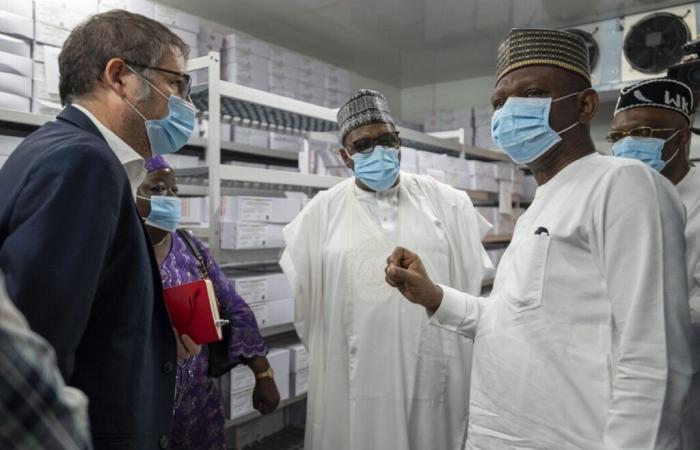Many people had stayed at home during the cold and misty morning of January 13 in Birnin Kebbi, capital of the state of Kebbi in northwest Nigeria. But at eight o’clock on Monday, breastfeeding mothers braved winter time to take their children to the downtown maternal and child health center to receive their malaria vaccine.
A sweet hubbin of laughter was heard within the clinic when women settled on carefully arranged benches, pending the start of the vaccination session. Soon, two vaccination agents, carefully dressed, presented themselves to inform the group gathered about R21/Matrix-M, the new vaccine against malaria.
Mothers already knew that the vaccine consists of four doses. Children aged five to eleven months are eligible for the first injection. Two additional doses follow four weeks apart, then a fourth and last injection takes place at least six months after the first. “We are very enthusiastic about this vaccine. He will protect our children from malaria, which is widespread here in Kebbi, “said Safina Muhammed after his five -month -old daughter Aisha received her first dose. “I would have liked my other children to also benefit from it, but they have exceeded the age of eligibility. »»
Malaria is very endemic in Africa, and Nigeria alone records the highest global incidence: around 27 % of the overall load and around 30.9 % of the 569,000 deaths recorded worldwide in 2023.
As elsewhere in the region, children under the age of five represent almost 76 % of deaths. But with the establishment of two revolutionary antimalarial vaccines, R21 and RTS, S, in 17 African countries, experts hope to see these dramatic figures fall back. It is still too early to provide for certainty the extent of this impact, but the data collected during the three -year pilot project carried out in Kenya, Ghana and Malawi from 2019 have shown that vaccination against malaria was Associated with a 13 % reduction in mortality in all causes in the age group, as well as a 22 % drop in hairy clinical malaria in eligible children.
A new shield for Nigeria
In October 2024, Nigeria received its first million doses of malaria vaccine thanks to the support of Gavi, the Alliance of the Vaccine, Unicef and the World Health Organization (WHO). The vaccination campaign was launched in early December, with the integration of the vaccine into routine vaccination calendars of Kebbi and Bayelsa states, which record the highest incidence of malaria in Nigeria.
Hafsat Shehu’s seven-month son, Abdul-Aziz, had just received his second dose at the Birnin Kebbi clinic. Shehu radiated by evoking the relief that this vaccine brings to itself and to many families in its community.
“My son received the first dose in December. [Dans le passé] We spent the money that should have served us to feed us to buy malaria drugs. This disease brought a lot of families to Kebbi. One of my neighbors lost her child because of malaria a few years ago. It was a really sad experience. So I was very happy when I heard about this vaccine, ”she said.
“Parents, especially those whose children have sickle cell anemia, do not joke with this vaccine at all. They absolutely want their children to receive it. »»
– Victoria Bankole, vaccination agent
The vaccine arouses massive membership
Participation in the vaccination campaign against malaria is impressive, according to health agents of primary care centers in Kebbi and Bayelsa states interviewed by VaccinesWork.
Since the start of the deployment, more than one hundred women have been going here every day of weekly vaccination – which falls on Monday in this establishment – to have their children vaccinated, explains Victoria Bankole, agent in charge of vaccination at the maternal health clinic and infantile.
“We also vaccinate up to 30 children on other days of the week. On vaccination days when there are a lot of people, breastfeeding mothers sometimes argue, so they are impatient to have their children vaccinated. Parents, especially those whose children have sickle cell anemia, do not joke with this vaccine at all. They absolutely want their children to receive it, ”she adds.
For her part, Agnes Sunday, a nurse with the understanding Health Center d’Azikoro, in the state of Bayelsa, specifies that her establishment leads a public campaign so that each eligible child receives the four doses.
Nearly 200 children receive the antimalarial vaccine in this center every week, she adds, stressing, however, that parents should not lower their care once their children immune.
“We send messages to mothers to remind them of the time to bring their children to receive the following dose. We always encourage them to ensure that their children complete the four doses so that the vaccine is fully effective.
-“We also advise mothers to protect their children from mosquito bites. Even if they have been vaccinated, they must continue to sleep under impregnated mosquito nets. Parents must keep their environment clean and consult a doctor as soon as they see symptoms of malaria in their children, ”says Sunday.
Mobilization strategies bear fruit
Significant progress has been made in the states of Kebbi and Bayelsa since the launch of the vaccination campaign, with “thousands of eligible children” having already received the first dose, said Remi Adeleke, head of public relations for public relations The National Primary Health Care Development Agency (NPHCDA), the organization responsible for coordinating the distribution of vaccines nationally, during an interview with VaccinesWork.
“Community engagement initiatives have strengthened awareness and acceptance of the vaccine. The NPHCDA has actively collaborated with the governments of the States, traditional leaders, health professionals and community organizations to mobilize the population. Awareness campaigns via radio, social networks and interpersonal communication channels have played a crucial role in the adoption of the vaccine.
“Deployment is progressively progressing to other states, in accordance with the malaria vaccine extension plan in Nigeria. We also strengthen the cold chain to ensure the good conservation and transport of vaccines, and we form health workers to support the administration of the vaccine. The NPHCDA relies on technology to ensure real-time monitoring and effective control of the distribution of the vaccine, “he said.
Adeleke added that the NPHCDA collaborates with donors and partners to obtain additional supplies, in order to complete the million doses already received. He stressed that the agency undertakes to make the antimalarial vaccine accessible to all children eligible in Nigeria.
Professor Seiyefa Brisibie, Bayela State Health Commissioner, said that the objective is to vaccinate 7,500 children per month in this state and that more than 98 % of this figure were achieved during the first month.
He added that 7,371 children were vaccinated in December 2024 with the first dose. “The second dose has already started in all structures, and eligible children are currently receiving it. The ACSM team (advocacy, communication and social mobilization) organized awareness meetings in districts, with the participation of major stakeholders. There have been street parades, radio programs, radio spots as well as television jingles to encourage parents to have their children vaccinated.
“In two local communities, we have tested a digital monitoring application (e-tracking app) to help parents come back in time for the following doses. We also use our usual routine vaccination monitoring systems, such as recall boxes (Tickler Boxes) and door-to-door mobilization, to make sure that families return for the following doses ”, it detailed.
Professor Brisicie, a specialist in family medicine, said that the Primary State Health Commission has set up a device to treat complaints relating to post-vaccination undesirable effects (AEFI). He stresses that parents are well informed and invited to return to health structures if they see symptoms in their children.
“Reference hospitals are designated to take care of serious cases at no cost for parents. The costs of treatment of post-vaccination side effects are fully covered by the State Health Commission, “he added.
A pediatric vaccine
The National Coordinator of the National Program for the Elimination of Malaria (NMEP), Dr. Godwin Ntadom, explained that adults living in endemic areas develop partial immunity against malaria after being infected several times, which reduces their risk of death compared to that of young children.
“The majority of deaths due to malaria concern children under the age of five. Once they go beyond this age, the risk of dying of malaria decreases. What kills these young children is severe malaria infection. She becomes complicated, and the child succumbs to these complications. The vaccine acts by protecting them from the serious forms of malaria.
“We started with the States of Bayelsa and Kebbi, and the campaign will be extended to other states. The NMEP collaborates with the NPHCDA for this deployment. We also document the challenges encountered in order to resolve them. But the vaccine is safe, effective, and it is currently the best option for children. The main objective is to ensure that children under the age of five do not die from malaria, “said Dr. Ntadom.





